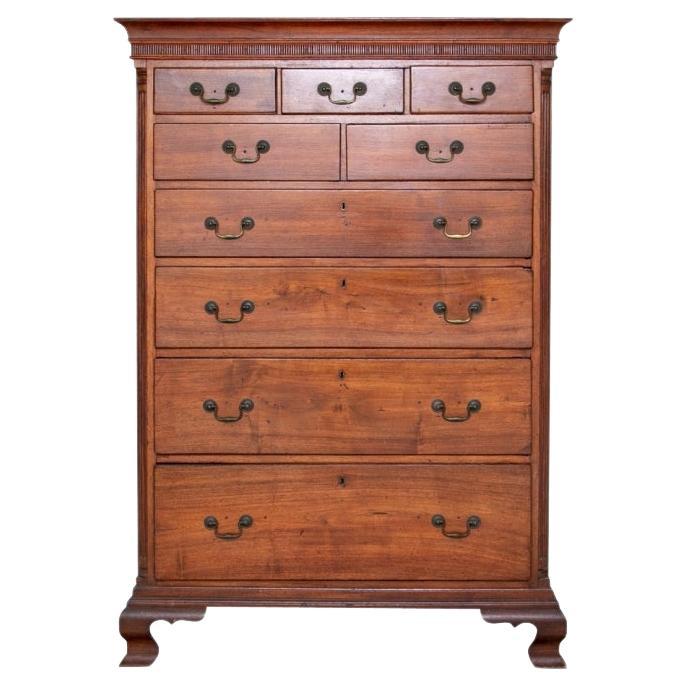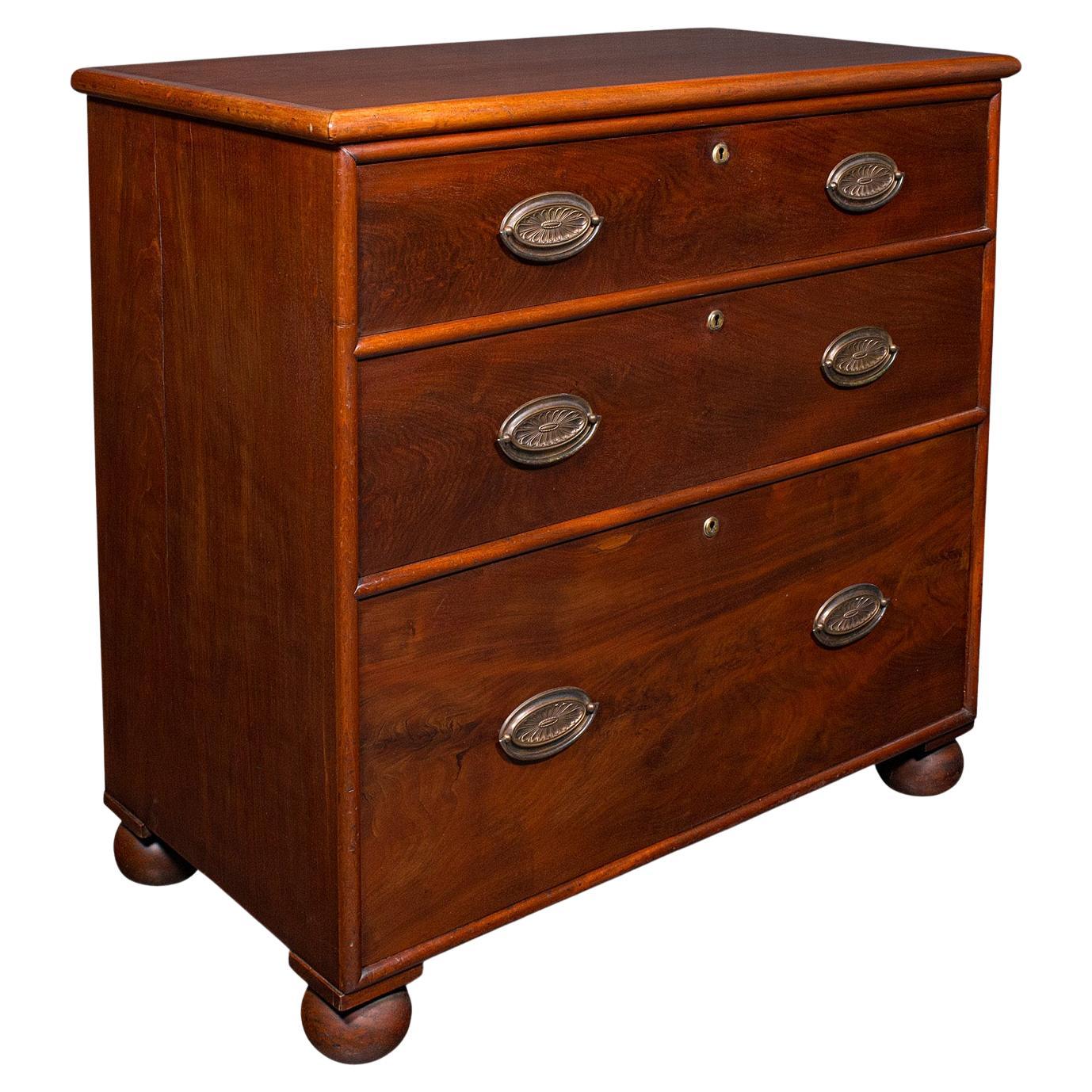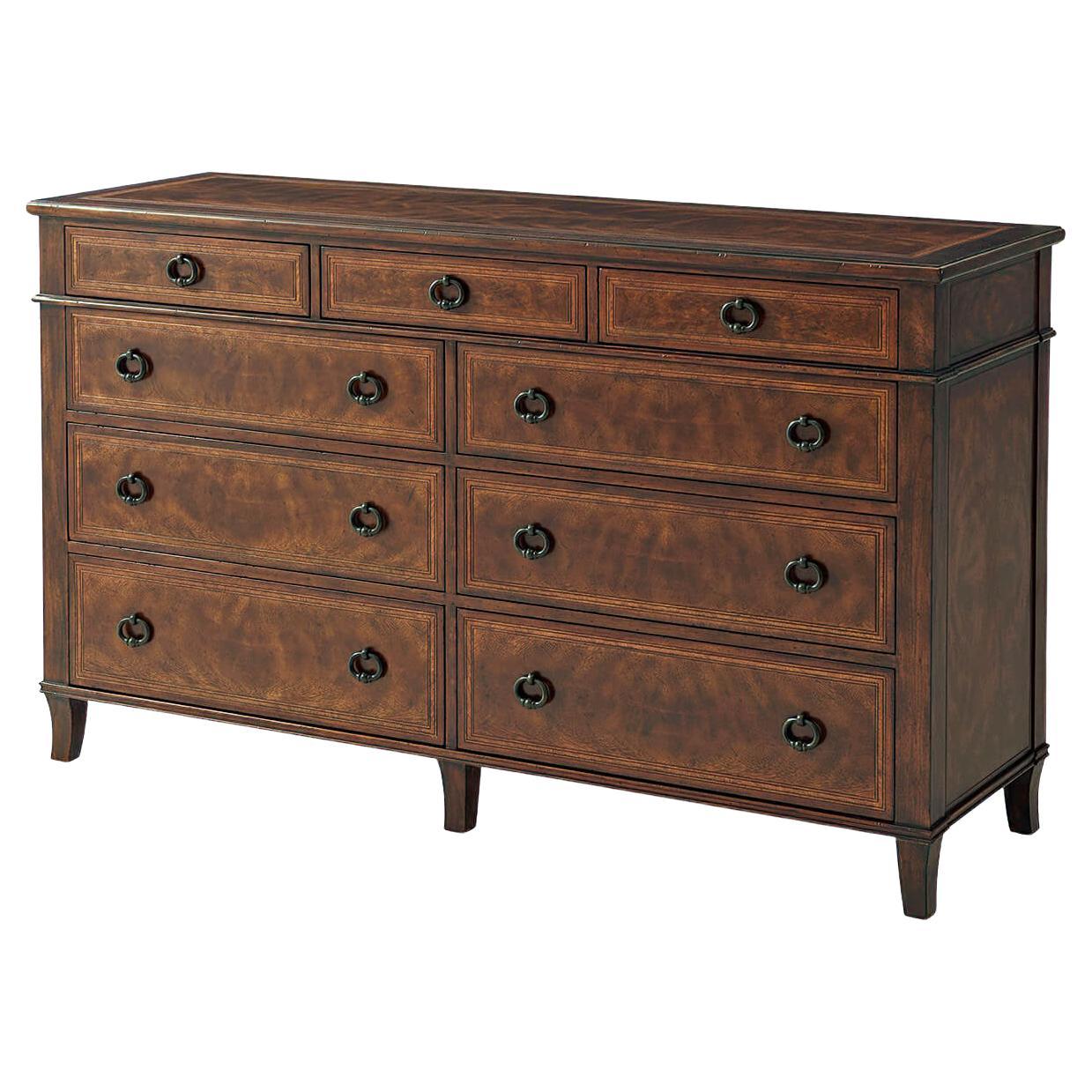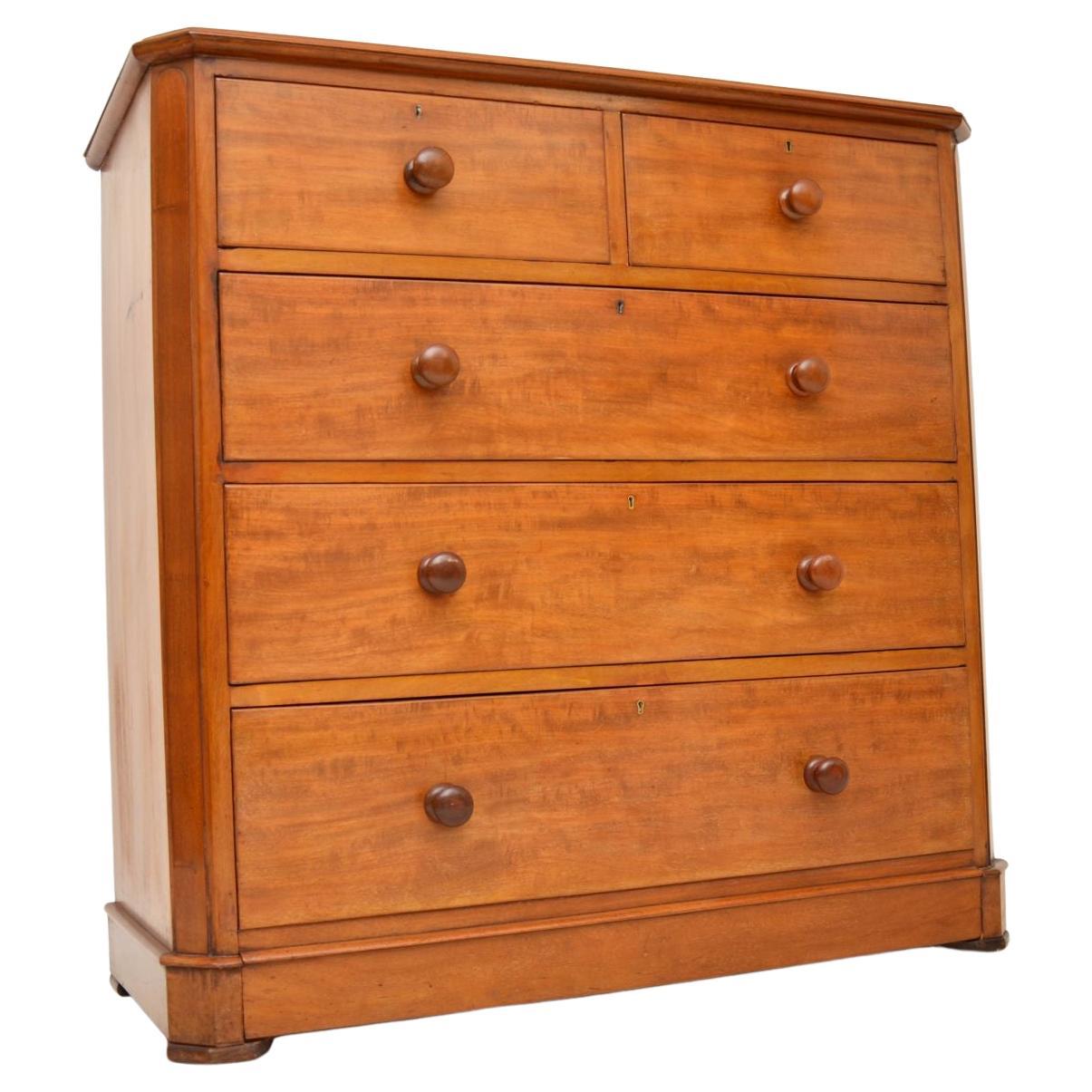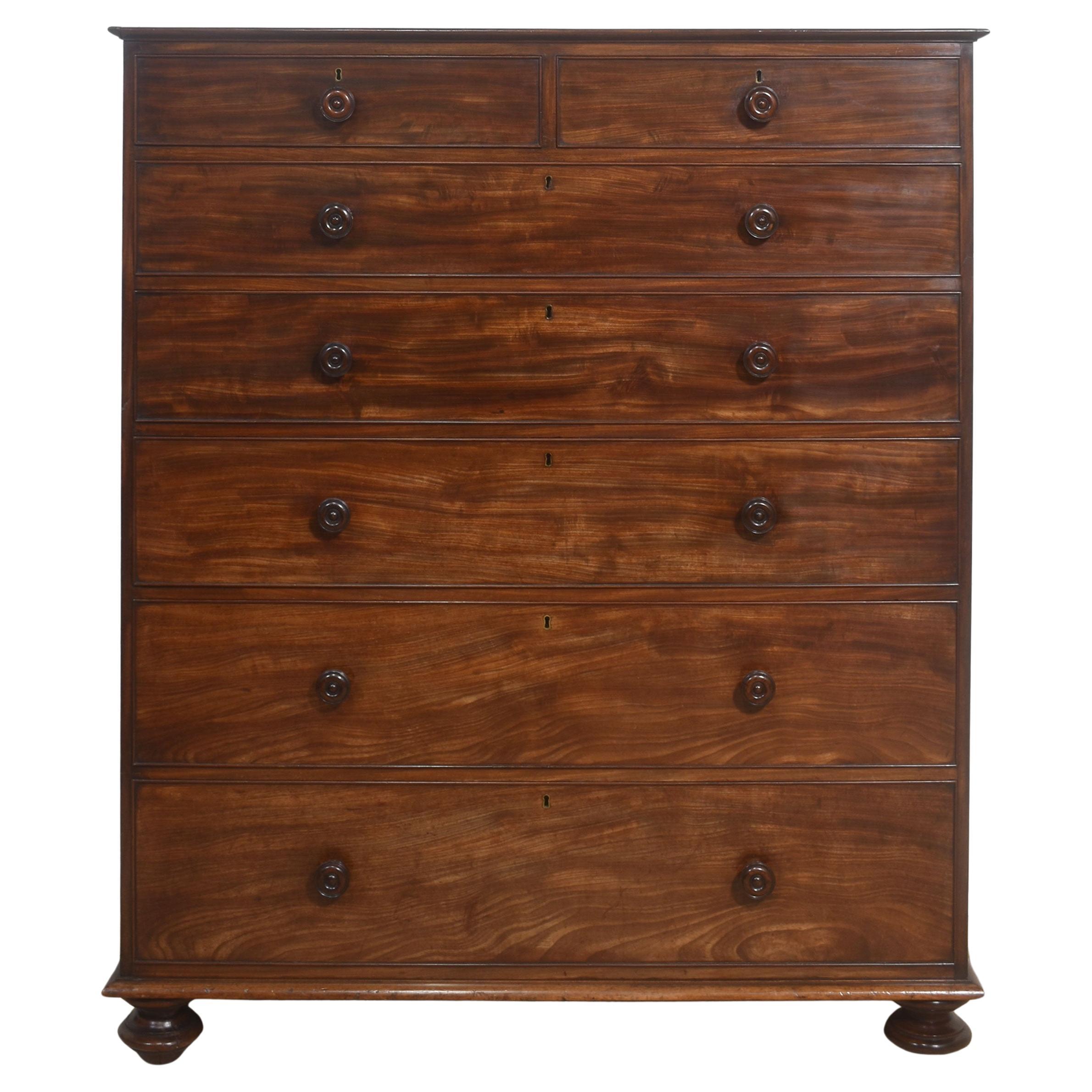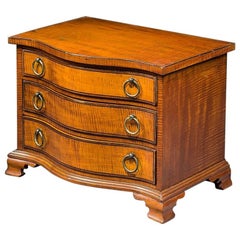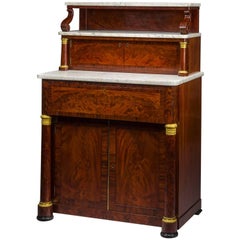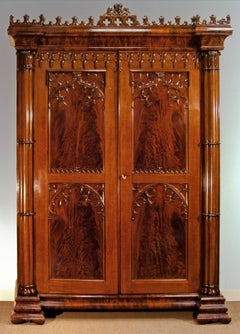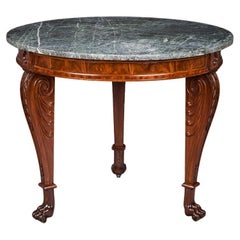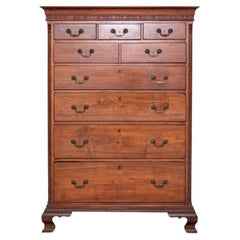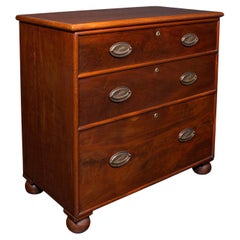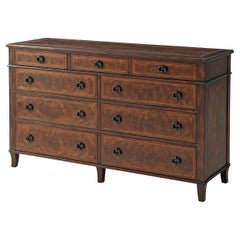Items Similar to Seven-Drawer Tall Chest of Drawers
Want more images or videos?
Request additional images or videos from the seller
1 of 7
Seven-Drawer Tall Chest of Drawers
$30,000
£22,881.92
€26,056.97
CA$42,159.15
A$45,980.48
CHF 24,357.36
MX$551,240.64
NOK 310,204.44
SEK 283,658.94
DKK 194,671.08
About the Item
Boston, Massachusetts
Seven-drawer tall chest, circa 1825.
Mahogany (secondary woods: mahogany, pine, and poplar)
Measures: 45 5/8 in. high, 27 5/8 in. wide, 14 5/8 in. deep
Inscribed (on six drawer locks): SECURE; (on seventh lock): CHUBB’S / PATENT / 57 St PAULS CHY / LONDON / CHUBB & SON / MAKERS TO / HER MAJESTY / 632284; (on one hinge): [BUR?] NE PATENT; (on master lock): 2 LEVER.
Although some Boston furniture of the Neo-Classical period is elaborately decorated with ormolu mounts, brass moldings, and carved and gilded elements, other pieces are more simple and are said to reflect the “conservative” taste of many of Boston’s great families. The simplicity evident in these pieces is not an indication of a less-expensive line of furniture or a less-sophisticated patronage, but, like the so-called “Grecian Plain Style” of Duncan Phyfe’s furniture in the 1830s and into the 1840s, is instead a reflection of a new aesthetic which evolved from a parallel stylistic evolution among English and French cabinetmakers beginning in the late 1820s.
Here, the focus is on the selection of the finest mahogany veneers, the grain of the wood becoming the principal decorative device. And if the added flourishes of ormolu and brass mounts have been forsaken, so have gilt-brass pulls, the seven drawers here equipped with original beautifully turned mahogany knobs, which are characteristic of Boston production of this period.
As a form, the seven-drawer chest is a standard item among English and French cabinetmakers, both those working earlier and later, but it appears to be otherwise unknown among the production of Boston neoclassical cabinetmakers.
In the present example, a vertical element on hinges running the full height at the right can be locked in order to secure the contents of all of the drawers, each of which is also supplied with its own lock.
In typical Boston fashion, the secondary woods are largely mahogany, underlining the extraordinary quality of pieces such as this.
In the year 1804, Charles Chubb started the firm of Chubb’s as ships ironmongers in Winchester, England. In 1818, Chubb and his younger brother Jeremiah founded the Chubb Company and opened a workshop for making locks on Temple Street in Wolverhampton, England. In 1820 they opened a shop at 57 Saint Paul’s Churchyard in London. The firm remained in business until 2003, when it was sold to United Technologies Corporation.
Condition: Excellent. The mahogany surfaces have been cleaned and French polished over the remains of the original finish.
- Dimensions:Height: 45.75 in (116.21 cm)Width: 22.5 in (57.15 cm)Depth: 14.63 in (37.17 cm)
- Style:Neoclassical (Of the Period)
- Materials and Techniques:
- Place of Origin:
- Period:
- Date of Manufacture:circa 1825
- Condition:Refinished. Wear consistent with age and use. CONDITION: Excellent. The mahogany surfaces have been cleaned and French polished over the remains of the original finish.
- Seller Location:New York, NY
- Reference Number:Seller: FAPG 20820D/21stDibs: LU90326654143
About the Seller
No Reviews Yet
Recognized Seller
These prestigious sellers are industry leaders and represent the highest echelon for item quality and design.
Established in 1952
1stDibs seller since 2010
Associations
Art Dealers Association of America
- ShippingRetrieving quote...Shipping from: New York, NY
- Return Policy
More From This Seller
View AllMiniature Striped-Maple Serpentine Chest of Drawers
Located in New York, NY
American, probably Boston or Salem, Massachusetts
Miniature Serpentine Chest of Drawers, circa 1785-1800
Striped maple, ebony, and rosewood (secondary woods: mahogany), with brass dr...
Category
Antique 1780s American Chippendale Commodes and Chests of Drawers
Materials
Wood
Butler's Desk and Etagére, New York, Possibly Duncan Phyfe
By Duncan Phyfe
Located in New York, NY
Butler’s Desk and Etagére, circa 1825
New York, possibly by Duncan Phyfe
Mahogany (secondary woods: mahogany, pine, poplar), with ormolu mounts, marble,...
Category
Antique 1820s American Neoclassical Cabinets
Materials
Mahogany
Gothic Armoire
Located in New York, NY
FAPG 19959D/2
Gothic Revival armoire
New York, about 1835-1840
Mahogany, with brass hardware
Measure: 104 in. high, 73 in. wide, 30 in. deep
Exhibited: Hirschl & Adler Galleries, New York, 2011–12, The World of Duncan Phyfe: The Arts of New York, 1800–1847, p. 89 no. 45 illus. 89
Ex coll.: Private collection (probably R. H. Selstadt, Big Stone Gap, Virginia)
Although no specific pieces of Gothic furniture documented as by Duncan Phyfe have come to light, there is considerable evidence that he, like various of his contemporaries in New York, embraced the Gothic style. For example, the catalogue of the Halliday & Jenkins auction sale of the contents of Phyfe’s furniture ware rooms, which was held on site at 192 and 194 Fulton Street, New York, on April 16 and 17, 1847, included a “mahogany centre table Gothic gilt pillar and Egyptian marble top” (Halliday & Jenkins, p. 3 no. 63); “12 mahogany Gothic chairs...
Category
Antique 19th Century American Gothic Revival Wardrobes and Armoires
Materials
Brass
$125,000
Center Table with Scroll Legs, Paw Feet and Marble Tops
By Thomas Seymour
Located in New York, NY
Center Table, about 1818–20
Attributed to Thomas Seymour (1771–1848), working either for James Barker or for Isaac Vose & Son, with Thomas Wightman (1759...
Category
Antique 1810s American American Classical Center Tables
Materials
Wood, Mahogany
Fan-Carved Wood Mantel in the Federal Taste
Located in New York, NY
New York,
Fan-carved mantel in the Federal taste, circa 1812
Pine
Measures: 66 1/4 in. high, 90 3/8 in. wide, 13 1/4 in. deep
Within the genre of carved rather than plasterwork mantels of the Federal Period, no example that has come to light is more perfectly designed or more carefully wrought than the present one, which is an amazing symphony of fans, urns, beads, and other Neo-Classical devices, all ultimately influenced by the plasterwork designs of the English architects Robert (1728–1792) and James (1732–1794) Adam.
Of a type that proliferated in the area bounded by the northern New Jersey counties of Bergen and Passaic, the Hudson Valley, and western Long Island, the mantel is representative of work that flourished in the first couple of decades of the 19th century. While most of the woodwork of this style that has survived is found in interiors, various examples of exterior doors and other trim have been noted, but most examples have disappeared as a result, variously, of natural deterioration and purposeful demolition in anticipation of development.
Although considerably larger in scale and more elaborate in ornament than a mantel that has been in the collection of the Brooklyn Museum since 1944 (acc. no. 44.55; photograph in Hirschl & Adler archives), the present mantel is so close in style and conception to that example that it likely originated in the same house.
The Brooklyn mantel is documented as having been removed from a house built by Judge Isaac Terhune (1762–1837), an eminent lawyer and judge. The house was situated on King’s Highway, at the corner of Mansfield Place, at the edge of South Greenfield, a village in northern Gravesend, Brooklyn. A photograph of the house, taken by the German e´migre´ photographer, Eugene Armbruster (1865–1933), is in the collection of the New-York Historical Society.
Terhune is ultimately descended from the Dutch-Huguenot e´migre´ Albert Albertson Terhunen, who died in Flatlands, Brooklyn, in 1685.The family eventually spread out through New Amsterdam, Long Island, and Bergen County, New Jersey. Terhune’s great-grandson, also Albert (1715–1806), left a sizable estate to his six surviving children, including his second child and second son, Isaac.
Judge Terhune lived in the house until his death in 1837, at which time, according to an article in The New York Times for November 27, 1910, he, having died without issue, “left the White Frame Mansion with its exquisitely carved doorway, beautiful mantels, and other interior adornments to his brother John” (Part Six, p. 11).
The article continues:
After the latter’s death, the house and its estate of about 70 acres passed through several owners, eventually being purchased in 1853 by Benjamin G. Hitchings [1813–1893].
The house next passed to Benjamin’s son, Hector, who had been born in the house, and then lived there for 25 years. He sold it in 1910 in partial payment for a Manhattan apartment house. After thus having been sold to a real estate developer, the Hitchings property was subdivided into Hitchings Homestead. The house survived until about 1928, at which time it was razed and a Deco-style apartment house with the address 2301 Kings Highway was constructed on the site and occupied in 1935.
By 1910, the fate of the house, in an area of Brooklyn that was being rapidly developed, was becoming obvious. The Times article reported:
The house has been well kept up, but fearing lest the hand of time or vandals might deal harshly with some of its choice bits of carving, Mr. Hitchings removed a few years ago a few beautifully carved wood mantels...
Category
Antique 1810s American Neoclassical Fireplaces and Mantels
Materials
Wood
Pier Table
Located in New York, NY
One of the signature forms of the Neo-Classical period, the pier (or console) table received its name from its typical use against the wall, or pier, between two windows. Pier tables...
Category
Antique 1810s American Neoclassical Tables
Materials
Marble, Brass, Bronze, Lead
$65,000
You May Also Like
Antique Tall Chest Of Drawers
Located in Bridgeport, CT
A handsome Antique Chest with fine traditional form and good color. Antique tall chest of drawers with three over two over four graduated drawers. T...
Category
Antique 19th Century Federal Commodes and Chests of Drawers
Materials
Brass
Antique Chest of Drawers, English, Storage, Cot Drawer, Neoclassical, Victorian
Located in Hele, Devon, GB
This is an antique chest of drawers. An English, mahogany storage piece with cot drawer in Neoclassical taste, dating to the mid Victorian period, circa 1860.
Fine-quality storage c...
Category
Antique 1860s British Neoclassical Commodes and Chests of Drawers
Materials
Brass
Antique chest of drawers from the turn of the 19th and 20th centuries, Northern
Located in Chorzów, PL
An antique chest of drawers from around 1900.
Furniture in very good condition, after professional renovation.
Dimensions: height 117 cm / width 107 cm / depth 56 cm
Category
Antique Early 1900s Scandinavian Other Commodes and Chests of Drawers
Materials
Walnut
Large Italian Chest of Drawers
Located in Westwood, NJ
An Italian neoclassic style mahogany dresser, the rectangular cross-banded top above three short frieze drawers and six further long graduated drawers, on splayed legs.
Dimension...
Category
21st Century and Contemporary Vietnamese Neoclassical Commodes and Chest...
Materials
Wood
$7,947 / item
Large Antique Victorian Chest of Drawers
Located in London, GB
A large and very impressive antique Victorian chest of drawers. This was made in England, it dates from around the 1840-1860 period.
It is o...
Category
Antique 1840s British Victorian Commodes and Chests of Drawers
Materials
Wood
Tall mahogany chest of drawers
Located in Cheshire, GB
Tall mahogany chest of drawers, the rectangular top above two short and five long mahogany lined graduated drawers, all with turned mahogany knob handles. Raised up on bun feet.
Dime...
Category
Antique 19th Century British Commodes and Chests of Drawers
Materials
Wood
$4,910 Sale Price
20% Off
More Ways To Browse
Duncan Phyfe
Duncan Antique Furniture
Duncan Phyfe Furniture
Duncan Phyfe Style
Antique Duncan Phyfe
Duncan Phyfe Antique Furniture
Seven Drawer Cabinet
Boston Chest
Kai Kristiansen For Aksel Kjersgaard
Swedish Blue Painted Chest Of Drawers
Vintage 5 Drawer Chest
18th Century Marble Top Dresser
18th Century Venetian Commode
Antique 2 Drawer Cabinet
Antique Collectors Chest
Black Marble Top Chest
Brass Clad Cabinet
Catalan Cabinet
